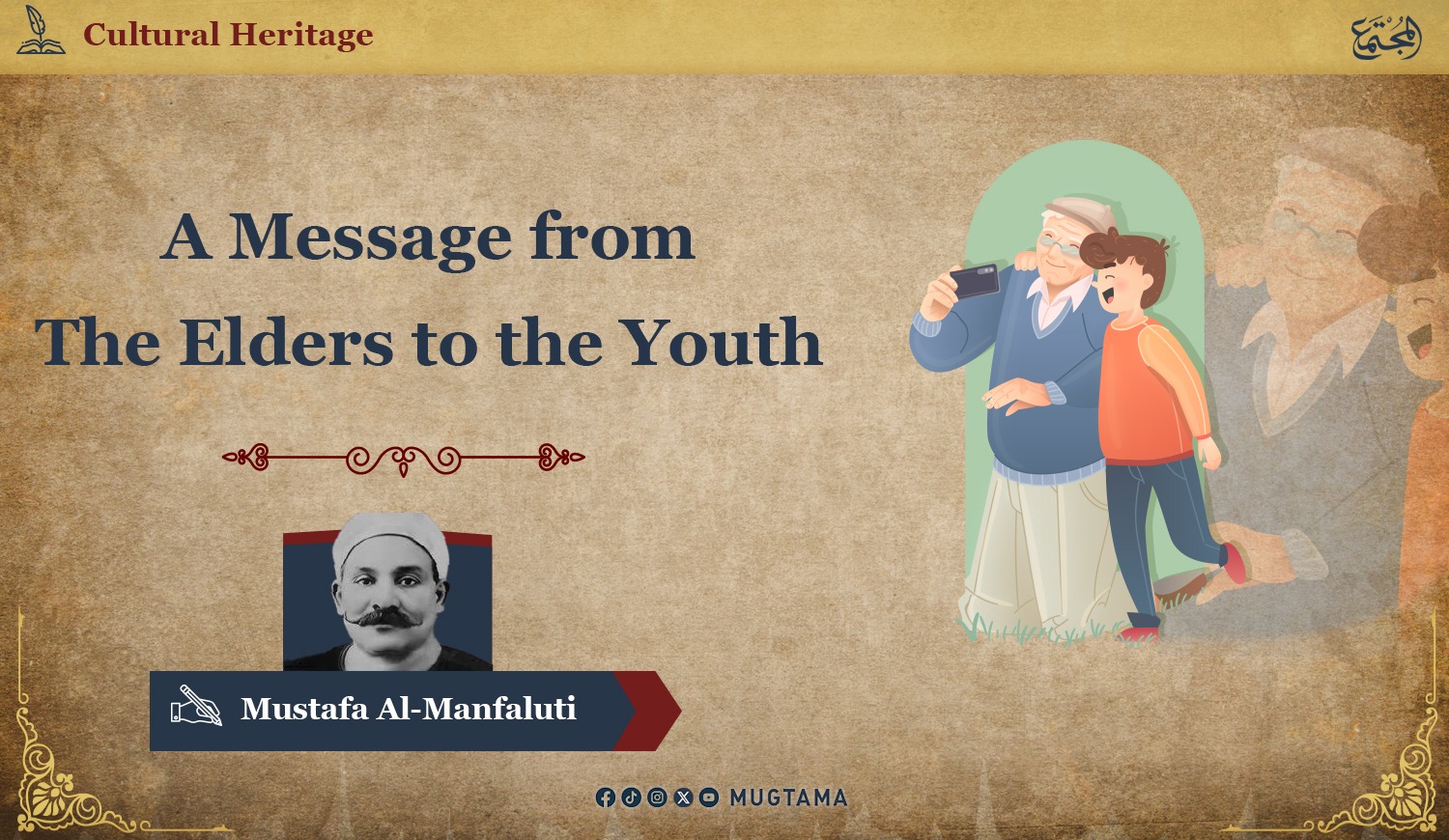A Message from the Elders to the Youth

We cannot deny, O sons, that your
youth holds greater strength and energy, more ambition and firmer resolve than
our old age. Your youthful, capable hands can reach places that our pale,
veined hands cannot. Your opinions, thoughts, and all the imaginations and
hopes that color your youth are sharper and more intense, deeper and more
profound than our opinions and perceptions.
But what we do reproach you and
deeply blame you for is your disdain toward us, your scorn for us, and the way
you accuse us of rigidity at times and senility at others whenever we disagree
with you on a matter.
We also fault your pride, your
arrogance, and your immense self-admiration that makes you imagine that these
beautiful colors with which your present lives are adorned are exclusively
yours, specific to your time alone, unseen by any generation before you, and
that no youth before you ever experienced such brightness. You believe
yourselves to be the pioneers and creators of these things. But had you been
able to carry yourselves toward reflection and deliberation, and to shift your
gaze from the present to the past, even though it’s not the nature nor trait of
youth, you would have known that this era you now boast of and flaunt with all
its dreams, wishes, ideas, and visions had once passed through us in our time.
We, too, had a youth like yours, imagining
as you do, thinking as you do, and echoing in our hearts, our conversations,
and our writings the same thoughts and opinions you echo today. Then that time
passed, its signs faded, and the overwhelming psychological turmoil that once
raged within us calmed. We entered the real world, one of seriousness and
labor, of reflection and contemplation, of experience and trial.
We were thus able to return to
ourselves, regain our senses, and descend gently and quietly into the depths of
our hearts to carefully review those thoughts, ideas, dreams, and hopes. We
came to distinguish between what was beneficial and what was harmful, what was
true and what was false, what was reasonable and what was delusional. We
examined things from all angles, seeing both their beauty and their ugliness,
weighing them all. We accepted what had more merit than fault and discarded
what had more harm than good.
So in truth, you have no special
merit in what you claim as your own alone, to the exclusion of all others. The
merit belongs to youth, its temperament, its nature, and its intensity.
Knowledge or ignorance, intelligence or foolishness, progress or backwardness
has nothing to do with it.
Youth has many characteristics,
the foremost of which is short-sightedness, rash judgment, and the inability to
firmly connect the three phases of time: the past, present, and future. Youth
cannot firmly imagine that the past is the foundation of the present and its
very source, that the present shines only from its dawn and grows only in its
soil. Nor can it accept that the future lies in the hands of harsh nature and
its unyielding laws. Rather, it imagines it can, in one moment, wipe away the
face of the universe—its earth and sky—and recreate it anew in whatever form it
desires. It believes it can turn dust into water and water into dust, that it
can shield the sun with its own hand so that no ray of light escapes without
its will, and that it can command the sun to pierce the veil of night and shine
in the sky whenever it wishes.
They continue to fumble in such
dreams and imaginations, dreams that hold no benefit or outcome, until the
first signs of old age appear. Then their rebellion calms, its intensity
weakens, and soon it finds itself kneeling before the divine power and the laws
of nature, acknowledging its weakness and inability, and the emptiness of its
hands from all might and strength, crying out: “Indeed, the universe has a Lord
I cannot oppose, and nature has a law I cannot change.”
We used to think a lot about
women, as you do today. No conversation was more pleasant or more delightful
than one about her. We were so enamored with her, so eager to please and pamper
her, to hold a special place in her heart, that we defended her even against
ourselves. We sought for her more influence and authority over us than she ever
demanded. We wished, with all sincerity, that she would enjoy freedom to its
fullest extent, to adorn herself as she pleases, unveil as she wishes, and sit
beside men in both public and private gatherings without objection or
interference.
In our eagerness to flatter and
please her, we went even further. We would overlook her moral lapses and label
them mere slips, insignificant stumbles unworthy of attention. We encouraged
her to scrutinize her husband harshly for any betrayal and to retaliate in
kind, for we had established for her the principle of complete equality. We
told her: it is not fair for a husband to be angry at his wife’s betrayal if he
himself betrays her.
We thought these opinions to be
genuine, deeply rooted beliefs springing from the depths of our hearts. Later,
we realized we had been deceived, that these were merely the thoughts and whims
of youth, its games and jokes, its dreams and illusions. Nothing weighed more
heavily on a young man at the start of his life than the veil covering a
woman’s face or the barrier that stood between them.
We rejoiced in everything new, as
you do, and rejected everything old, as you do. We considered the former a
miraculous wonder, no matter how ridiculous or cold, and the latter a disaster
of disasters, no matter how valuable or grand. Not because we had weighed them
and judged them based on merit, but because we were still fresh out of
childhood. And a child is easily bored, he tires quickly of his toys, breaking
them after just a day and replacing them with others.
We were obsessed with imitation
as you are now. We hardly recognized any unique identity in our actions. Every
image passed before us, regardless of its kind or color, and we snatched them
up faster than a camera captures pictures, as if the expanse of our lives was a
laboratory for life’s experiments and trials.
Anyone among us who learned a
foreign language quickly became infatuated with it and its speakers, sometimes
to the point of scorning his own language and history. He would refrain from
mentioning its figures and great men in conversations and citations, mocking
them whenever someone else brought them up. Not because he understood those
others or even his own, but because he was naive and gullible, belittling what
he possessed and glorifying what others had.
Only after that phase had passed
did we realize we had been mistaken in all these ideas, that they were not
fixed beliefs in our hearts, but shadows and images appearing in the sky of our
lives. We admired them, became thrilled by their beauty and vibrant colors. But
eventually, we became moderate in our views, deliberate in our judgments. We
came to love women’s freedom, but detest her indecency and immorality. We took
the materials of civilization and progress from advanced nations, but we did
not imitate them blindly. We loved Western literature and science, and admired
their writers and scholars, but we did not scorn our own figures and history
for that.
We do not ask you, O sons, in
your current storm of youthful passion, to be moderate or deliberate in your
judgments and ideas, or calm in your ambitions and hopes. It would be unfair to
ask from you what we did not expect from ourselves. But there is one thing we
held on to dearly in our time, one thing we now ask you to hold onto as well,
to guard it as we did:
We believed, like you, that we
were better than our fathers and grandfathers,
more knowledgeable and perceptive. We perhaps even believed many of them
were as you now see us: ignorant, delusional, backward, or rigid. But that
never prevented us from preserving their status as fathers, from honoring their
role. We never called them by any of the names you now call us. We never spoke
ill of them in their presence or absence in a way that would spoil what little
time they had left among us.
We treated them in righteousness
and respect, honoring their beliefs and views—despite the vast gap between us—just
like Khalid ibn ʿAbdullah al-Qasri, governor of
Iraq. He had embraced Islam after once being a Christian, yet his father
remained Christian. When his father asked him to build a church in his palace
to practice his religion, he built it for him as requested and never once
objected to any of his affairs throughout his life, until his father returned
to his Lord.
This is what we ask you to
preserve for us, as we preserved it for our fathers and grandfathers before
you. And remember: a day will come upon you just as it came upon us. You will
not want your sons and grandsons to treat you the way you treat us today. So
fear Allah regarding us. Do not let your children and grandchildren treat you
tomorrow as you treat us now.
Fear Allah regarding us and our
old age. We are your fathers who bore you, your teachers who raised you. It is
one of the greatest shames on you and your history to curse your fathers and
teachers, to throw in their faces accusations of ignorance and rigidity. They
are neither ignorant nor rigid. They are simply old and incapable!
-------------------------------------------------------------
Taken from the book: “Al-Nazarat.”











